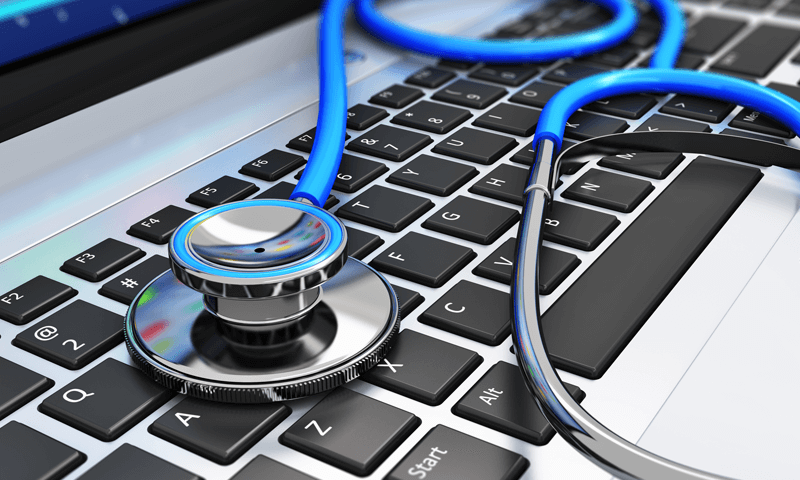5 Ways Advancements in Technology Are Changing Healthcare
Technology is continually evolving and offering new conveniences for society.
With healthcare being such a central part of community wellness and advancement, this is an area that is experiencing particularly substantial technological growth.
Some reports indicate that the expected compound annual growth rate for the digital health market from 2019 to 2025 is approximately 25%.

Telehealth
Telehealth both allows for quicker, more convenient check-ins, and for social distancing in the event of a contagious disease. Telehealth is considered to be any form of health service being handled over an electronic medium.
However, telehealth is increasingly taking place on video conferencing platforms, which allows patients and healthcare providers to speak naturally with each other and share sensitive information quickly. Telehealth video conferencing platforms are typically very secure due to the sensitive nature of the information being shared.
Artificial Intelligence
Artificial intelligence can be used in many areas of healthcare as a means of automating various activities and reducing the burden on human healthcare workers. The sophistication of these technologies can vary widely depending on their purpose and the stage of development. The following are a few examples of how artificial intelligence is being used in the healthcare industry:
- Diagnostic support: AI can process patient information to improve the diagnostic process.
- Chatbots: patient-facing chatbots can answer simple inquiries and appropriately redirect patients to allow healthcare personnel to be available for more pressing tasks.
- Robotic surgeries: AI-supported robots can act as valuable support during surgeries where extreme precision is needed or during lengthy surgeries that are likely to cause fatigue in a human surgeon.
- Automation of administrative duties: there are many administrative tasks carried out daily that are relatively repetitive and can easily be handled by an AI-supported system. This support can free up administrative workers to focus on more complex tasks.
Meanwhile, other forms of automation can be used to monitor the health of patients in their daily lives.
Healthcare Wearables
Healthcare wearables are any health-related device that patients can wear. Perhaps the most well-known are those related to fitness, such as the Fitbit. However, they can also be used to monitor and manage a wide array of health issues, including cardiovascular disease, immune disorders, reproductive challenges, and diabetes.
These devices improve patient care by allowing for constant monitoring of conditions. This in turn allows for more immediate and accurate care related to any issues that are identified by the device. Such devices may also make it easier to identify patterns related to your health concerns, which can allow doctors to better diagnose and treat the issue.
Remote IT Management
Many healthcare providers are receiving additional support from remote IT management companies to further ensure the security of sensitive patient information. Outsourcing elements of it can also reduce the cost of maintaining a large resource, and allow the user to enjoy any extra benefits offered by the company, such as cloud storage solutions.
The following are a few ways that remote IT management can apply to healthcare:
- Remote monitoring and management: remote monitoring and management involve a wide range of activities, including network monitoring and troubleshooting. In healthcare, it is particularly important to monitor the quality and safety of your network constantly. Network uptime (functionality) allows all operations — patient care, cybersecurity — to proceed effectively. If any one part of the network goes down, the entire system is vulnerable and may fail entirely. Remote management gives you alerts in real-time and enables you to fix problems immediately.
- Implementation of cybersecurity updates: implementing updates is an important part of ensuring that your network is secure and functioning at an optimal level. Cybersecurity updates for a healthcare organization should be implemented as soon as they are available.
- Rapid response to cybersecurity concerns: cybersecurity concerns may be more likely to be identified early and handled efficiently when managed by a remote IT team. This is because the network will be constantly monitored by IT specialists.
- Secure transfer and storage of information: many IT management companies offer secure options for information storage that utilize encryption. This can help facilitate the safe transfer of information between healthcare facilities if they share the same remote IT company.
Remote IT management is becoming increasingly common alongside digital transformation in business.
Digital Transformation
Digital transformation refers to any effort to digitize information and the means through which it is managed, stored, and shared. In the context of healthcare, digital transformation often involves changes such as the use of cloud storage, digitization of patient files, and access to digital test results.
These developments allow information to be shared more quickly and securely between healthcare facilities, healthcare providers, and patients. Digitization also reduces waste related to physical documentation.
The Future of Healthcare Technology
Several developments in healthcare technology are still in their infancy, though promising. Mobile health is one relatively new development that is quickly gaining ground, spurred on not only by the convenience and efficiency, but also by events such as the COVID-19 pandemic.
Meanwhile, developments like augmented reality still have quite a way to go before they are used more widely in the healthcare industry. There could be many applications for this technology, but most notably it may be able to help healthcare workers train more effectively without putting a living patient at risk.
Ongoing healthcare developments benefit all areas of healthcare, from administrative operations and information storage to diagnostics and patient monitoring.
Ready to Get Started?
- Uncover Network Blind Spots
- Resolve Issues Faster and Easier
- Exceed Service Delivery Expectations